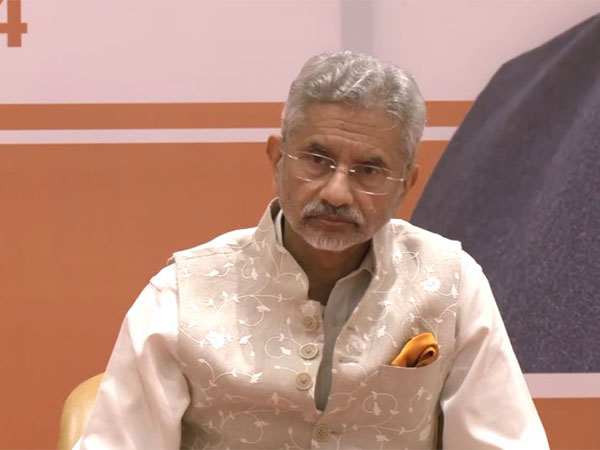
Ahmedabad : External Affairs Minister S Jaishankar said that two things are currently happening in the Red Sea, which includes attacks on ships through drones and missiles as well as pirates of Somalia taking over the ship.
Jaishankar stated that it is the responsibility of India to look at such situations in the neighbourhood and how to tackle them in cooperation with other nations.
While addressing a press conference in Ahmedabad, he said that a large number of Indian nationals are in merchant navy. He stated that most of the crew members are Indian nationals in case of an attack on a ship and added that India is worried about their safety. He also highlighted the impact of conflict between Israel and Hamas on the sea route.
On being asked about the long-term plan for the merchant navy community which depends on the sea route that is presently infested with Israel-Hamas conflict and pirates, Jaishankar said, "This is not just the problem of Gujarat, but India or I should say the whole world. The war that started between Israel and Gaza has effect on other places as well. In the Red Sea, two things are happening- one, some powers are attacking shipping through drones and missiles. Second, pirates in Somalia are taking over the ships as they think that it's an opportunity for them because the world's eyes are on drones and missiles."
"For us, there are two concerns - first, our trade happens through the Red Sea, Western Arabian Sea through the Suez Canal. So, that is a matter of concern because insurance rates increases and a lot of shipping instead of Suez Canal goes down from Africa which increases the shipping cost. Second, our citizens are in large numbers in Merchant Shipping, we will be either number one or second spot with the Philippines. Hence, if there is any attack occurring on the ship, most of the crew members are our citizens and we are worried about their safety," he added.
Highlighting India's efforts amid piracy, he said, "The government decided that first, we sent eight naval ships there. After that eight became twelve. I think the last figure I was told was 21, maybe it will be a little above or below. So for the last three months, our ships have been patrolling there and patrolling is being conducted in three types of operations - one is antipiracy, and another is that if a ship is in danger then how can we reach there immediately to protect it. There were one or two ships which caught fire and their crew abandoned them. So, our Navy soldiers went there, rescued the ship, repaired it and handed it over to them."
He recalled that Philippines President Ferdinand "Bongbong" Romualdez Marcos Jr expressed his gratitude to India publicly for the release of abducted sailors.
He said, "And recently I was in the Philippines and there the President of the Philippines expressed his gratitude to India publicly. He said that it is because of you (India) that abducted sailors were released. These activities are going on there right now. This is our responsibility today."
"We have to do it for ourselves but we also have to do it for the world. When we say Bharat rising, when we talk about Viksit Bharat, with hard work and prosperity, comes responsibility. Its our responsibility to look at such situations in our neighbourhood and how to tackle them in cooperation with other nations. That is the situation right now," EAM added.
Notably, the Indian Navy has carried out several high-octane operations against piracy attacks lately.
Last week, at least 23 Pakistani nationals were rescued from the clutches of Somali pirates during a daring 12-hour-long operation in the Arabian Sea, said the Indian Navy.
The dramatic rescue unfolded in the early hours of March 29, 2024, when the Indian Navy warship INS Sumedha intercepted the hijacked vessel, FV Al-Kambar, as it was being held captive by pirates. Acting swiftly, INS Sumedha was soon joined by the guided missile frigate INS Trishul to bolster the operation.
Utilising their tactical expertise and strategic coordination, Indian naval forces initiated negotiations with the pirates, compelling them to surrender without bloodshed. The surrender marked a decisive victory for the Indian Navy in combating piracy and ensuring the safety of maritime activities in the region.
Following the successful apprehension of the pirates, Indian Naval specialist teams embarked on the FV Al-Kambar to undertake thorough sanitisation and seaworthiness checks. These meticulous examinations aim to ensure the vessel's safety before escorting it to a secure area, enabling the resumption of normal fishing activities for its crew.
On Friday evening, the Indian Navy responded to a potential piracy attack on an Iranian fishing vessel in the Arabian Sea and diverted two naval ships to intercept the hijacked vessel. The Indian Navy received input regarding a potential piracy incident onboard the Iranian fishing vessel 'Al Kambar'.
Following this, two Indian Naval ships deployed in the Arabian Sea for maritime security operations were diverted to intercept the hijacked fishing vessel. At the time of the incident, the Iranian vessel was approximately 90 km southwest of Socotra and was reported to have been boarded by nine armed pirates. The hijacked fishing vessel was intercepted on March 29.
"Indian Navy remains committed to ensuring maritime security in the region and safety of seafarers, irrespective of nationalities," the statement added. (ANI)